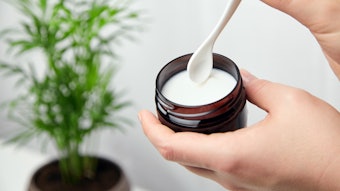
Arbalon R-50 cellulose liquid (INCI: Glycerin (and) Cellulose (and) Cellulose Gum), from Lubrizol Life Science (LLS) Beauty is a microbial fermentation-derived rheology modifier.
According to the company, it provides powerful suspension in skin and hair cleansers, along with sustainability, versatility and compatibility. Produced in partnership with CP Kelco, the ingredient is said to deliver high-performing formulations with low environmental impact.
Arbalon R-50 was developed using plant-derived cellulose and the bacterium Komagataeibacter xylinus—the same organism used to produce the translucent, jelly-like food known as nata de coco in many Asian countries. The aerobic bacteria produce a 3D network of very fine interconnected microfibers that reportedly can suspend air bubbles. These fibers are designed to trap and hold materials in surfactant applications.
While chemically identical to plant-derived cellulose, Arbalon R-50 cellulose liquid fibers are smaller in diameter, which LLS explains leads to a higher surface area by weight of the cellulose. For example, typical fiber diameters for plant-derived cellulose range from 30-300 µm; in this ingredient, they are more than 300 times smaller, the company notes, which is said to provide more efficient suspension and to create a true yield stress even at low concentrations.
From the archives: In the Thick of It
LLS adds that formulations can be designed ranging from water-thin, such as in a suspending foaming hand wash, to honey thick, e.g., in a surfactant-thickened body wash. In the latter case, Arbalon R-50's high compatibility with salt-induced surfactant thickening is reportedly unique among nature-based polymers. Further, the ingredient is compatible with a broad range of ingredients, including fragrance, conditioning agents, exfoliants and thickeners.
"Fermentation as a process has been used for thousands of years, bringing us products as diverse as sourdough bread, yogurt, kimchi and beer, as well as skin care-friendly ingredients such as lactic acid and probiotics," write Brian Figura, Ph.D., global product manager, and Rebekah Smith, global market segment manager for skin cleansing at LLS.
"We know there are several benefits to using fermented beauty ingredients on the skin. However, microbial fermentation also plays a key role in the production of workhorse stabilizer ingredients that enable formulators to accomplish stability, product consistency and quality. The microbial fermentation process is also a sustainable, eco-friendly method capable of producing products with a favorable biodegradation profile."
From the archives: How Do I Thicken My Cosmetic Formula?










